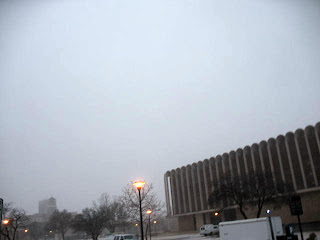 Blowin' like sixty out there. Where we live, on the South Plains, the weather we receive is particularly diametrical according to the prevailing wind patterns: if it's early Spring (around here, after Feb 15), or mid-May, we get the wettest warm weather of all--trade winds blowing up out of the Gulf. Most of the rest of the year, it's dry as hell and the winds blow almost all the time west-to-east. When it's west-northwest we get hellacious thunderstorms, when the even-drier northern New Mexico air hits the damper Gulf weather nudging up over the Caprock Escarpment just to the southeast. When it's west-southwest (unusual) it's like the Santa Ana winds out of Arizona--dry, hot, and gritty (what we were getting two days ago in the dust-storms).
Blowin' like sixty out there. Where we live, on the South Plains, the weather we receive is particularly diametrical according to the prevailing wind patterns: if it's early Spring (around here, after Feb 15), or mid-May, we get the wettest warm weather of all--trade winds blowing up out of the Gulf. Most of the rest of the year, it's dry as hell and the winds blow almost all the time west-to-east. When it's west-northwest we get hellacious thunderstorms, when the even-drier northern New Mexico air hits the damper Gulf weather nudging up over the Caprock Escarpment just to the southeast. When it's west-southwest (unusual) it's like the Santa Ana winds out of Arizona--dry, hot, and gritty (what we were getting two days ago in the dust-storms).
But along about mid-January we get the coldest, and typically the driest, part of the winter: when the wind blows straight the hell down out of the north, all the way from Montana and Saskatchewan. That's when it's a cooold mo-fo out there, when the wind whistles right down the avenues of the campus and the shivery little underdressed Houstonians and Austinians exclaim "it's say-oh cooowwllddd out thar! Ain't chew cooowwwlllddd?!?" We ex-pat New Englanders tend to just hunch our shoulders and pull on our gloves.
Hump/crunch day. Thursdays this semester are the most out-straight of all: Dharmonia yoga class at 8am, Executive Committee at 9am, meet w/ student independent study at 10:30am, Musicology staff lunch/round-table at 11:30, teach Diaspora seminar at 12:30, break for 30 minutes at 2, studio lesson at 2:30, finish updating materials for Friday Discussion Sections (led by TA's), home around 5, cook dinner, work on music textbook materials, 8:30 play coffeehouse gig, 10pm home to finish Friday preparations and crank out a blog post. Don't leave much breathing space.
But, Friday's an easier day: TA's have the 10am class, so there are some meetings before and after lunch--but I've kept the day intentionally as open as possible, so that the extensive away-dates and long weekends (mine, in this case, not the students') necessitate the least missed- and thus made-up Lubbock obligations. I like to be on-hand for the first iteration of the TA-led discussion sections, and to look-in about 10 minutes into the meeting, just so that the kiddos know that Dad's in the house and he'll get out the Belt if he has to (there's a great scene in the classic film A Christmas Story, during which the Little Brother, hiding in horror under the kitchen sink, whines "Daddy's gonna kill Ralphie!").
But the Friday discussions have the more significant merit of providing the TA's the deep-end-of-the-pool experience of having to hold 35-55 kids' attention, and maintain order and cohesive intellectual effort, without Dad (or Mom) in the room--a crucial learning-by-doing overall dynamic. There are kids who will not speak up in the lecture meetings because, despite the staff's best efforts, they're still too intimidated or afraid that they'll "sound stupid." Discussion sections help them, because their sense of the consequences of an uncertain answer is lessened. And, because ultimately we want them to discourse with each other. When there is someone in the room whose catalyst role they are accustomed to, they get used to following, rather than leading. And at some point they're going to have to take command, if only of their own intellectual processes.
They're partly resistant, and partly passive, and partly lazy--but mostly they're just scared, and all that other stuff is just cover for being scared. They're scared mostly because their experience has been woefully limited (by intention of their elders), and once they arrive on campus, they begin to intuit those limitations. They begin to suspect that the world is bigger, culture more complex, history more nuanced, morality more subjective, suffering more random and more inevitable, than they have been taught. And they know they don't understand these things--hell, they begin to intuit that they don't even know how to read for content--and they get scared that they're alone in these limitations--rather than that those limitations are multiple-generation-wide.
So they're quiet and "passive" and "unresponsive" in class, because they're (in many cases) desperately hoping to conceal what they think is their anomalous lack of preparation, talent, or insight. Our job is to provide a vision of an active intellectual life, the rewards and challenges that such a life offers, and a plausible, tangible, concrete, believable map through that terrain.
Below the jump: Blue Norther on the South Plains.



Thursday, January 31, 2008
Day 16 "In the trenches" (Blue Norther edition)
Posted by
CJS
at
7:55 PM
![]()
![]()
Labels: Education, Trenches series
Subscribe to:
Post Comments (Atom)
No comments:
Post a Comment